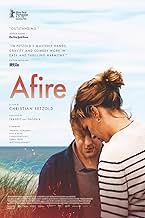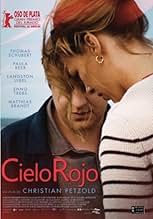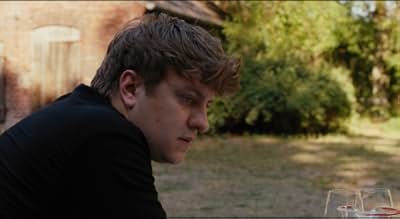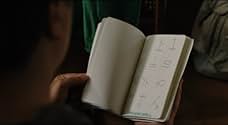AVALIAÇÃO DA IMDb
7,1/10
10 mil
SUA AVALIAÇÃO
Uma casa de férias junto ao mar Báltico. Os dias estão quentes e não chove há semanas. Quatro jovens se reúnem, velhos e novos amigos. À medida que as florestas secas ao redor deles começam ... Ler tudoUma casa de férias junto ao mar Báltico. Os dias estão quentes e não chove há semanas. Quatro jovens se reúnem, velhos e novos amigos. À medida que as florestas secas ao redor deles começam a pegar fogo, o mesmo acontece com suas emoções.Uma casa de férias junto ao mar Báltico. Os dias estão quentes e não chove há semanas. Quatro jovens se reúnem, velhos e novos amigos. À medida que as florestas secas ao redor deles começam a pegar fogo, o mesmo acontece com suas emoções.
- Prêmios
- 10 vitórias e 28 indicações no total
Avaliações em destaque
The actor Thomas Schubert deserves much of the credit for making "Afire" work as well as it does.
He plays a self-absorbed, petty, insecure writer who's so myopically obsessed with the book he's writing that he's oblivious to the world around him. In other hands, it would be a big ask of the audience to spend two hours with such a tiring character, especially since he's in virtually every scene of the movie. But Schubert is able to make this character not only tolerable, but relatable. We're all guilty of missing the bigger picture because of our individual preoccupations.
The ending of "Afire" feels a bit overly dramatic. It's like something that would feel right at home in one of those Southern gothic plays by Tennessee Williams or Eugene O'Neill. But I did enjoy the irony of its conclusion -- once our main character starts paying attention to the trauma around him, it's something he uses to write better books.
Grade: A.
He plays a self-absorbed, petty, insecure writer who's so myopically obsessed with the book he's writing that he's oblivious to the world around him. In other hands, it would be a big ask of the audience to spend two hours with such a tiring character, especially since he's in virtually every scene of the movie. But Schubert is able to make this character not only tolerable, but relatable. We're all guilty of missing the bigger picture because of our individual preoccupations.
The ending of "Afire" feels a bit overly dramatic. It's like something that would feel right at home in one of those Southern gothic plays by Tennessee Williams or Eugene O'Neill. But I did enjoy the irony of its conclusion -- once our main character starts paying attention to the trauma around him, it's something he uses to write better books.
Grade: A.
Director Christian Petzold (PHOENIX, TRANSIT) appears to be in a slightly different mode at first with his latest, AFIRE. Four people gather at a seemingly idyllic summer retreat in the Baltics.
The home is owned by the family of Felix (Langston Uibel). He and his friend Leon (Thomas Schubert) discover that a young woman has sublet a bedroom as well, Nadja (played by Petzhold regular, Paula Beer). A local lifeguard Deved (Enno Trebs) completes the quartet. Leon is there to work on a rewrite of his novel, while Felix is completing a portfolio of photographs.
Petzold has said that he found inspiration in the work of Eric Rohmer and one can certainly see the influence as the characters go through their paces and engage in barbed conversations and behaviors. The original German title translates roughly as 'Red Skies' and refers to the crimson glow from nearby forest fires in the region.
Petzold's script takes a bit to come into focus and is impeded by the character of Leon, a petulant sort who is neither sympathetic nor particular interesting for much of the action. Schubert's performance similarly is off-putting at first and never quite makes him worthy of much investment. Fortunately, Beer is her dependable self and keeps the film moving along, all the while revealing layers of her character. Uibel and Trebs are fine as is Matthias Brandt as Leon's literary editor.
AFIRE has an appropriate denouement (if a bit on the nose) and Petzhold delivers one last mischievous wink to the viewer.
The home is owned by the family of Felix (Langston Uibel). He and his friend Leon (Thomas Schubert) discover that a young woman has sublet a bedroom as well, Nadja (played by Petzhold regular, Paula Beer). A local lifeguard Deved (Enno Trebs) completes the quartet. Leon is there to work on a rewrite of his novel, while Felix is completing a portfolio of photographs.
Petzold has said that he found inspiration in the work of Eric Rohmer and one can certainly see the influence as the characters go through their paces and engage in barbed conversations and behaviors. The original German title translates roughly as 'Red Skies' and refers to the crimson glow from nearby forest fires in the region.
Petzold's script takes a bit to come into focus and is impeded by the character of Leon, a petulant sort who is neither sympathetic nor particular interesting for much of the action. Schubert's performance similarly is off-putting at first and never quite makes him worthy of much investment. Fortunately, Beer is her dependable self and keeps the film moving along, all the while revealing layers of her character. Uibel and Trebs are fine as is Matthias Brandt as Leon's literary editor.
AFIRE has an appropriate denouement (if a bit on the nose) and Petzhold delivers one last mischievous wink to the viewer.
This had potential, there is a good movie inside this movie, just not the one i watched.
It's like this movie has a beginning and an end but not anything in between. This want to be a "character study" but there is not a smooth transition in this leading character's development: He is always immature and suddenly he supposedly has an epiphany. There is no chemistry between him and Nadja, are we suppose to believe that she is attracted to him? Why? How? And the ending is just lazy writing. Symbolisms are naive. And it's "easy". Big events are easy. A more lowkey approach would be better.
Having said that, this is a somewhat good slowburn drama, not a "heavy" drama, neither a comedy as it labelled. I loved the song. Kinda interesting, some intense moments, subtle and well acted. As another reviewer mentioned, "That works up to a point, but there was too much missing from the puzzle for me to really find myself engaged with any of them".
It's like this movie has a beginning and an end but not anything in between. This want to be a "character study" but there is not a smooth transition in this leading character's development: He is always immature and suddenly he supposedly has an epiphany. There is no chemistry between him and Nadja, are we suppose to believe that she is attracted to him? Why? How? And the ending is just lazy writing. Symbolisms are naive. And it's "easy". Big events are easy. A more lowkey approach would be better.
Having said that, this is a somewhat good slowburn drama, not a "heavy" drama, neither a comedy as it labelled. I loved the song. Kinda interesting, some intense moments, subtle and well acted. As another reviewer mentioned, "That works up to a point, but there was too much missing from the puzzle for me to really find myself engaged with any of them".
In interviews director Christian Petzold gave in connection with the release of "Roter Himmel" he said that he was inspired by French summer / coming of age films from for example Eric Rohmer. According to Petzold this type of film had disappeared out of German cinema since "Menschen am Sonntag" (1930, Robert Siodmak, Edgar Ulmer and Rochus Gliese). "Roter Himmel" is indeed situated during summer, but that is where any comparison ends. The beginning of "Roter Himmel" is much more a parody on the American style coming of age films such as "The cabin in the woods" (2011, Drew Goddard) with a car breaking down in the woods and creepy animal noices thereafter.
"Barbara" (2012, Christian Petzold) was still an explicit political movie about living in the DDR. Since then the films of Petzold have remained socially concerned but have become more abstract. In "Undine" (2020) a water nymph symbolizes the element of water. In "Roter Himmel" forest fires sumbolizes the element of fire. It looks like Petzold has begun a series about the elements, just like Krzysztof Kieslowski made a series about the ideals of the French revolution in the 90's. We are looking forward to the next film.
Forst fires are unfortunately very actual in the summer of 2023. However these fires are not the main theme of the film. "Roter Himmel" is not an eco-drama. They remain on the background, at least that is what we and the characters in the film belief for (too) long.
The main character of the film is Leon (Thomas Schubert), a writer writing his second book and desperately trying to match the success of his first novel. He wraps his uncertainty in a cloak of arrogance and self esteem and in so doing gets estranged from the people around him. These people are for him more an obstacle for working undisturbed than a source of inspiration. When they go for a swim he always says that his work doesn't allow him to join them, only to waste his time when they are gone.
An important moment in the film comes when the publisher of Leon meets him to discuss the progress of his work. He doesn't like the manuscript, but he is very interested in what the people around Leon are doing. Will Leon's eyes finally open?
"Barbara" (2012, Christian Petzold) was still an explicit political movie about living in the DDR. Since then the films of Petzold have remained socially concerned but have become more abstract. In "Undine" (2020) a water nymph symbolizes the element of water. In "Roter Himmel" forest fires sumbolizes the element of fire. It looks like Petzold has begun a series about the elements, just like Krzysztof Kieslowski made a series about the ideals of the French revolution in the 90's. We are looking forward to the next film.
Forst fires are unfortunately very actual in the summer of 2023. However these fires are not the main theme of the film. "Roter Himmel" is not an eco-drama. They remain on the background, at least that is what we and the characters in the film belief for (too) long.
The main character of the film is Leon (Thomas Schubert), a writer writing his second book and desperately trying to match the success of his first novel. He wraps his uncertainty in a cloak of arrogance and self esteem and in so doing gets estranged from the people around him. These people are for him more an obstacle for working undisturbed than a source of inspiration. When they go for a swim he always says that his work doesn't allow him to join them, only to waste his time when they are gone.
An important moment in the film comes when the publisher of Leon meets him to discuss the progress of his work. He doesn't like the manuscript, but he is very interested in what the people around Leon are doing. Will Leon's eyes finally open?
It's fair to say, there's no inferno or great blaze, and there's a good chance half way through, your eyes might start to glaze, the meandering's quite slow, although there is a subtle glow, but it struggles to compete with perpetual malaise. The perspective needs your mind to persevere, for reflections to emerge and re-adhere, consider landscapes past and present, how they change, evolve and ferment, locking horns with dread, anxiety and fears. The performances are fine, there is intent, although poor Leon is in permanent descent, lacks a flicker and a spark, you wouldn't say he is a lark, one of those people you might call, quite malcontent.
Você sabia?
- CuriosidadesChristian Petzold binged the films of Éric Rohmer while developing this project.
- ConexõesReferenced in Film Junk Podcast: Episode 929: Perfect Days + I.S.S. (2024)
- Trilhas sonorasIn My Mind
Performed by Wallners
Principais escolhas
Faça login para avaliar e ver a lista de recomendações personalizadas
- How long is Afire?Fornecido pela Alexa
Detalhes
Bilheteria
- Faturamento bruto nos EUA e Canadá
- US$ 244.803
- Fim de semana de estreia nos EUA e Canadá
- US$ 38.485
- 16 de jul. de 2023
- Faturamento bruto mundial
- US$ 2.295.497
- Tempo de duração1 hora 42 minutos
- Cor
- Proporção
- 1.85 : 1
Contribua para esta página
Sugerir uma alteração ou adicionar conteúdo ausente














